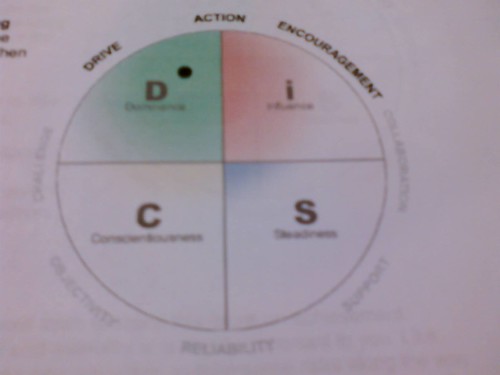
I’ve been to a couple management training seminars. And of course, there’s my time invested in PSI. I figured that FTI’s “Director/Manager School” would be at best a refresher, at worst a disheartening corporate-speak snoozer. But, I bucked up, dressed up, and opened my mind to the possibility that the experience would be worth my time.
It was. DiSC is one of many work-style assessment and awareness training systems. It starts with 75 words that the student grades from “never” to “always” in applicability to their work-style. Purportedly statistically sound algorithms categorize your style into four categories: Dominance, Influence, Conscientiousness, and Steadiness. This breakdown is similar to the Controller-Promoter-Analyst-Supporter roles in PSI. You may place dead center in a category, or close to a second category; you may place near the center (easy to shift) or high on the edge (born natural).
Surprise everyone: I’m a high Di! Modes I tend to exhibit: Drive, Active and Encouragement. Yeah, shocker. My polar opposite (or perfect counterpart) would be a classified a Reliable Objective Supporter.
So, it’s easy to generate a pile of stereotypical, useful strengths from this information. Generally speaking, almost every attribute we drilled into for D and i fit me pretty well; most of the others didn’t really apply to my core work style, though certain I have supported, analyzed, collaborated, and been reliable. The most useful bit was next.
After spending an hour or so examining the basic behaviors and stereotypes of each grouping, we started to dive into exactly how each group does (generally) and could (ideally) interact with each other group in some common managerial scenarios.
For example, the most interesting to me is how a D or an i could interact with a C. Many QA engineers are C’s (or S’s), and often the very best at the technology and the methodology are naturals and far from the center. The customized personal report described exactly what I do – sadly, the description was under the heading “Potential problems when working together.” But there is hope. I knew that C folks like to have logical, fact-based goals and that they like to work alone; what I didn’t know is that they often prefer written communication to my fly-by face-to-face drop ins and may perceive my checking in as a lack of confidence (in them), an annoyance or even bullying. They prefer to go over options slowly (something I’m not sure I’ve ever done intentionally) and need to know that they will be given the time and space to complete their tasks to their high quality bar.
So what will I change? Certainly I’m going to focus more on fact-based goals and remove some of the emotional/political/collaborative language that I so love using. Doing work to get so-and-so out from under water is probably less attractive than doing the same work to increase product quality. Heck, same same. Also, I’ve got to stop bothering them. No wonder I get those looks sometimes!
There was much more, but all in all I found the specific advice about interactions across category lines to be helpful. I’m no idiot; I know people are more complicated than just four work-style types. But learning how to motivate, delegate, develop, and collaborate with certain stereotypes will be a handy cheat-sheet for the office.




1 comment:
When I took DISC a few years ago, I was an S -- it's called a Coordinator/Supporter in my packet.
That means that I'm your polar opposite??
Post a Comment